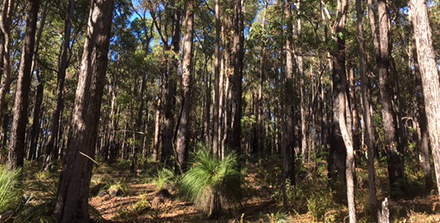
Regrowth jarrah forest south-east of Perth, logged at least three times already, now banned from harvesting by the McGowan government. This forest is ear-marked to be strip-mined for bauxite.
Alcoa is awaiting permission to mine vast areas of jarrah forest in Western Australia. The Sydney Morning Herald reported that the company has a longer-term challenge to gain environmental approval to clear more than 9000 hectares of forest. Source: The Sydney Morning Herald, Timberbiz
Forestry Australia has previously stated that it is puzzled by the fact that the sustainable harvesting of native forest products is ceasing, while broad scale clearing of thousands of hectares of jarrah forest for mining is allowed to continue, and even to expand.
And Alcoa’s application comes as Parkside Timber closed its mill at Nannup with 45 people losing their jobs.
The latest closure comes less than a year after the Queensland-based company shut its mill in Greenbushes following the WA government’s decision to ban native timber logging by 2024.
Alcoa has told US investors that the delayed approvals to extend its bauxite mining will cost the company money but the more stringent environmental standards would help it maintain community support so it could continue to mine in WA’s South West forests for another few decades.
The company wants to expand its footprint in the Dwellingup State Forest heading north and south.
Alcoa chief executive Roy Harvey called the proposal before the WA Environmental Protection Authority a “full-blown review” of how Alcoa will extend its Huntly mine into the new areas of Myara North and Holyoake for a decade from 2025.
In November 2022, the EPA requested Alcoa supply a swathe of additional information including considering if mining the new areas was consistent with the “ongoing ecological integrity of the northern jarrah forest”.
Mr Harvey said he was confident Alcoa could gain the approvals it needed to operate its three WA refineries “for another few decades”.
“Everything is lined up, we have the right people working on it, and I think we have the support of our host government,” he said.
Wilderness Society WA campaigns manager Patrick Gardner said it was encouraging that the EPA had added assessments of the carbon storage capacity of the forest, protection of mature forest and cumulative impacts to the work required to gain approval.
Mr Gardner said the same factors that drove the decision to end native forest logging – the drying climate and reduced regeneration capacity of native forests – were also playing out in the bauxite-rich northern jarrah forests.
“The wide-scale destruction from the logging, clearing, burning and mining of bauxite is only accelerating these impacts,” he said.
What is not spoken about is how will the land be cleared, what will be done with the trees that are cleared and what will be done about replanting them. Forestry is transparent about how trees will be cut, how many, what they will be used for and how many will be replanted.







